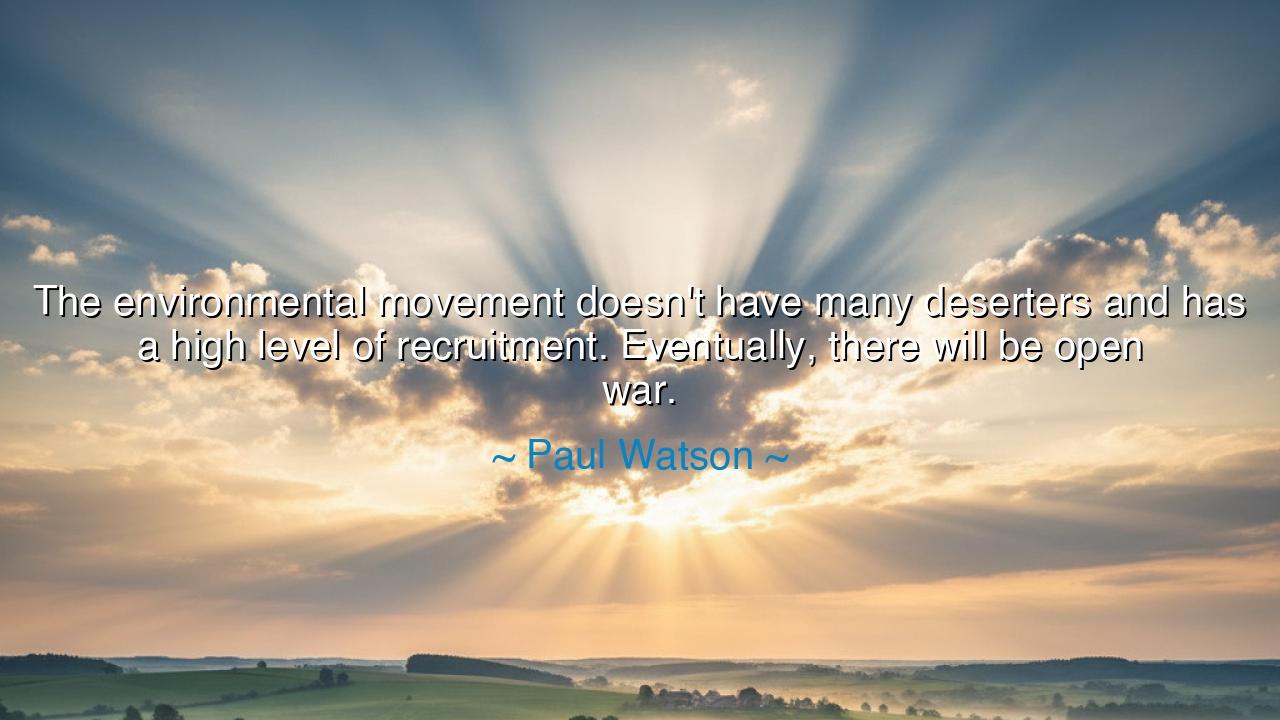
The environmental movement doesn't have many deserters and has a
The environmental movement doesn't have many deserters and has a high level of recruitment. Eventually, there will be open war.






The words of Paul Watson—“The environmental movement doesn't have many deserters and has a high level of recruitment. Eventually, there will be open war.”—carry the weight of prophecy and the fire of defiance. They are not spoken in the calm tones of diplomacy, but in the thunder of conviction. Watson, founder of the Sea Shepherd Conservation Society and a warrior of the oceans, has spent his life standing between the harpoons of whalers and the blood of the innocent seas. His quote is not merely about activism—it is a declaration of moral warfare, a vision of the inevitable conflict between those who protect the Earth and those who plunder it. To him, the environmental struggle is no longer a matter of debate or awareness; it is a battle for survival, where neutrality has become complicity.
The origin of this quote lies in Watson’s long and controversial career as an eco-warrior. Once a co-founder of Greenpeace, he broke away to form Sea Shepherd when he felt that protest alone was too passive to halt destruction. He believed that the planet’s enemies—the corporations that strip the seas, the industries that poison the air, the nations that exploit the land—could no longer be reasoned with; they must be resisted. His vision of “open war” is not one of guns and blood, but of courage and conscience—of direct action in defense of life itself. His words emerge from the frontlines of environmental struggle, where he and others have risked their lives to save the great whales, the coral reefs, and the silent wilderness that sustains us all.
To the ancients, such a battle would not have seemed strange. The poet Hesiod wrote of an age when humans lived in harmony with the gods and the Earth, and how, through greed, they fell into decline. The great epic wars—whether fought with swords, plows, or prayers—have always been about restoring balance. The environmental movement, as Watson frames it, is the modern embodiment of this ancient struggle between hubris and harmony. Where once warriors defended their homelands from invaders, today’s guardians defend the very fabric of life from the invasion of consumption. It is no less heroic, no less urgent. The battlefield has shifted—from open plains to oceans, from empires to ecosystems—but the spirit of resistance remains the same.
History gives us echoes of this truth. Consider the Chipko movement of India in the 1970s, when rural villagers—many of them women—embraced the trees to prevent loggers from cutting them down. Unarmed, poor, and overlooked by the world, they stood between greed and nature with only their bodies as shields. They did not see themselves as radicals, but as protectors of the sacred. Their courage halted deforestation and awakened a nation. Like Watson, they too fought a war, though without violence—a war of conviction, of sacrifice for the Earth. And their victory, though local, became a symbol of global awakening: that when humanity remembers its duty to the planet, no force can truly conquer it.
Watson’s claim that the environmental movement “doesn’t have many deserters” speaks to the deep moral loyalty of those who serve the Earth. Once the veil of ignorance is lifted, once a person sees the devastation of coral bleaching, the suffering of animals, or the poison in rivers, they cannot return to indifference. The cause becomes spiritual—it calls to the heart like a sacred vow. Such people do not fight for profit or power, but for the survival of generations unborn. This is why, as Watson says, “recruitment” is high: every act of destruction births a new defender. Every oil spill, every forest fire, every dying whale becomes a teacher that awakens the conscience of another soul.
And yet, the phrase “open war” is also a warning. Watson foresees a future when the conflict between the guardians of life and the merchants of death can no longer be hidden beneath politics or corporate slogans. When seas rise, when cities burn, when famine and drought become the language of the planet, the illusion of peace will shatter. Humanity will be forced to choose—either to continue serving the machinery of destruction or to rise in defense of the Earth. This is the war Watson envisions, not as a desire but as a destiny, born of human arrogance and ecological neglect. The question is not whether it will come, but whether we will stand ready on the side of life when it does.
The lesson, then, is one of awakening and courage. The environmental movement is not a distant cause—it is the defining moral struggle of our age. Each of us is enlisted the moment we open our eyes to the truth. We may not fight on the seas like Watson, but we can battle in our daily lives: through what we consume, how we vote, what we teach our children, and how we honor the living world around us. Let no one say the Earth’s defenders are few; they are as countless as the stars, for every heart that loves the sound of rain, the flight of birds, or the whisper of trees is already part of the army of hope.
So let Watson’s words burn within us as both prophecy and commandment. There will be open war, yes—but not one of hatred, rather of protection. Let our weapons be truth and empathy, our strategy be persistence, our victory be harmony restored. For when humanity finally fights not against each other but for the Earth, that war will mark the dawn of a new civilization—one worthy of the home it was given. And in that dawn, the warriors of life, like Paul Watson, will be remembered not as radicals, but as the guardians who answered the call when the Earth cried out.






AAdministratorAdministrator
Welcome, honored guests. Please leave a comment, we will respond soon